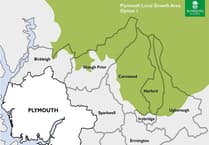A documentary has been released about the police investigation into the murder of South Hams woman Hollie Kerrell.
The 28-year-old was brutally murdered by her estranged husband Christopher Kerrell, 35, in April last year.
Murdered By My Husband: The Hollie Kerrell Story follows the Dyfed-Powys Police investigation into her death.
Police hope the programme will raise awareness of the eight warning signs that abusers typically display before killing their partner.
Kerrell was jailed for life for hitting Hollie over the head with a hammer and strangling her at her home while their children played nearby.
She moved to Wales from Slapton around ten years ago after finishing her education at Kingsbridge Community College.
The couple had been married since 2013 but friends called the relationship "volatile" and Hollie told her mother he had been violent towards her.
During the case, the court heard Kerrell was "violent, jealous and possessive" in the relationship.
Det Supt Anthony Griffiths said: “Hollie’s murder was a tragedy that left three young children without their doting mother.
“Until her murder, very little was known about her husband’s controlling behaviour.
“Things got a lot worse when Hollie attempted to end the relationship and tragically resulted in her murder."
Police say they hope the programme will raise awareness of the issues and protect others.
Pioneering research by former police officer turned criminologist Dr Jane Monckton-Smith shows the signs that escalate from previous convictions or track record, to abuse to murder.
Det Supt Griffiths said the force had the blessing of Hollie’s family to work with the programme makers.
He said: "We have worked closely with Crime + Investigation and Dr Jane Monckton-Smith, with permission from Hollie’s family, to highlight her story in the hope that it helps other women recognise the signs that could lead to homicide.
“Dyfed-Powys Police is now working closely with Dr Monckton-Smith, to embed her eight stages of domestic homicide within the policing response to improve the way we identify and protect victims of domestic abuse at the earliest possible stage.
“What I would really like most is for the public to be able to recognise these stages as it is their intervention or action that could make the real difference.
“If after watching this programme, someone recognises the signs that can lead to an increased risk of homicide in their own relationship, or that of a friend or family member, then please, do something about it.
“Whether that is reporting it to the police or speaking to the person affected about what they are going through or seeking advice and support from various agencies out there such as Women’s Aid or the Live Fear Free Helpline.”
The eight stages of domestic homicide
1. Pre-relationship history
The perpetrator probably has a criminal record or allegations from former partners of control, domestic abuse or stalking. Victims are often aware but do not always believe reports.
2. Early relationship
The relationship escalates quickly with early declarations of love, possessiveness and jealousy
3. Relationship
The relationship is dominated by coercive control, usually with some of the high risk markers
4. Triggers
An event occurs which threatens the control of the perpetrator - usually separation or its potential. Other triggers may be a physical or mental illness or financial problems.
5. Escalation
There is an increase in frequency or severity of control tactics, like suicide threats, begging, violence and stalking. These are attempts to reinstate control.
6. Change in thinking
The perpetrator is not getting back the control they desire so feelings of revenge, injustice or humiliation may drive a decision to resolve issues, through either moving on, taking revenge, or potentially homicide.
7. Planning
This stage may include buying weapons, seeking opportunities to get the victim alone, stalking and making threats.
8. Homicide
This may involve extreme violence, suicide, suspicious death, a missing person or multiple victims (including children).
To report domestic abuse call police on 101. If you’re calling the police as abuse is happening call 999.
The 24-hour National Domestic Violence Freephone Helpline, in partnership Women’s Aid and Refuge, is 0808 2000 247.
You can watch the documentary below…





Comments
This article has no comments yet. Be the first to leave a comment.